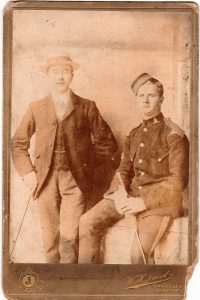Gerald Brazill was born on 13 December 1876 in Belfast, County Antrim, one of four children to John Brazil and Jane Wood.
At just 14 years old, he signed up to the 15th Hussars, a British Army Cavalry Regiment that had been formed in 1891. It appears that Gerald had inherited some of his father’s musical ability as he became a regiment drummer (and later a trumpet major); his father’s occupation was listed a ‘musician’ in the official enlistment records, and he had also served in the army.
During the first eight years of his service, Gerald remained in England before being deployed to India in September 1899, where he remained for the next three years. His career in the Hussars ended in 1903, after reaching the rank of corporal. However, at the start of the First World War, Gerald once again enlisted in the army, this time attaining the rank of Sergeant in the 1/1st Welsh Horse, a cavalry regiment raised on the outbreak of hostilities. When this regiment disbanded, he was transferred to the Royal Welsh Fusiliers and then finally to the Labour Corps, where he made 2nd Lieutenant.
While in the Welsh Horse, he become the regiment’s trumpet major, performing at many concerts and receiving glowing reviews from the local newspapers. One such event was a ‘smoking concert’, which took place in January 1915 and was covered by the Diss Express. The ‘very successful’ event included renditions of many humorous, sentimental and popular songs and the newspaper declared that Gerald’s bassoon solo during the concert ‘deservedly gained an encore’.
However, in that same year, Gerald’s name once again featured in the press, but this time for very different and far less favourable reasons. It turns out that Gerald was a bigamist. He was arrested in 1915 and appeared before the courts charged with ‘feloniously’ marrying Alice Turner. Gerald already had a wife, Lydia, who was still alive.
Gerald had married Lydia Windle at Halifax Register Office in 1906. The couple had lived in nearby streets in the town. It seems that the marriage was not a happy one and he left her several years later.
In February 1914, while still legally married to Lydia, Gerald Brazill and 24-year-old Alice Turner, a bookkeeper from Herne Hill in South London, were delivering their wedding vows at the register office in Hampstead. The couple had met in the capital when Gerald was playing the local music halls and had lived together in London. Alice had no knowledge of Gerald’s previous nuptials when they were first wed, only finding out three months after signing the register.
On 15 June 1916, Gerald appeared at the Old Bailey and pleaded guilty to the offence of bigamy. On being read the Warrant, Gerald had replied that he knew he was doing wrong, but had gone through with the marriage ‘for her sake’ and to save Alice’s name. The couple also had a child together, whom they named Mary. She was baptised at St Anne’s church in Wandsworth, London in November 1915, although Gerald did not attend the ceremony as he was with his regiment in the Dardanelles at the time. Tragically, Mary died only a few months after the ceremony.
There is a further twist to the story. It turns out that when Gerald deserted his first wife Lydia in October 1911, he also walked out on his two young children, Doris Lydia, aged four, and Gerald Algernon, who was one year and nine months old. In fact, he had previously been arrested for the offence of desertion and had served a month’s hard labour in prison.
Following his desertion, Lydia and their two children, who were living in Tynemouth, Northumberland, had been admitted to the workhouse, which had cost the local parish six pounds. The family had also received money after leaving the workhouse. Gerald agreed to pay her 7s 6d per week following the court case. It seems that Gerald had been sending her money when he had first left the martial home but had not been in contact after January 1912.
During his appearance at the Old Bailey in 1916, on the charge of bigamy, the judge told Gerald to ‘do the best he can’ for the two women. As an acting and ‘excellent’ soldier (according to Lieutenant Boyd Harvey of the 1st Welsh Horse), whose regiment was equipped and ready to go to the front and fight for King and Country, the judge passed a nominal sentence of just two days imprisonment, which in effect meant an immediate discharge.
Gerald survived the war, and by 1939 could be found residing in Brighton working as an orchestral musician. He died in Nuneaton in 1951, at the age of 74. His wife, Lydia Brazil, had died two years earlier, alone and living in a flat in Birmingham. The records have yet to reveal what happened to Alice Turner.
__________________________________________

This article was written using research by Kevin Parry, from Bedfordshire, who worked in the Police Service for 30 years and has been investigating his family history for some time. His interest in Gerald Brazill developed after his father left him a box of old photographs that contained images of unnamed men in military uniforms.
Further research revealed that one of the men in the photographs was Gerald Brazill (pictured on the right in the image), who was related to Kevin on his paternal grandmother’s side.
Using resources available on Ancestry and Findmypast websites, he was able to populate his family tree, and this is where he found out about Gerald’s bigamous activities. Birth, death and marriage certificates have provided additional information about Gerald’s family members.

